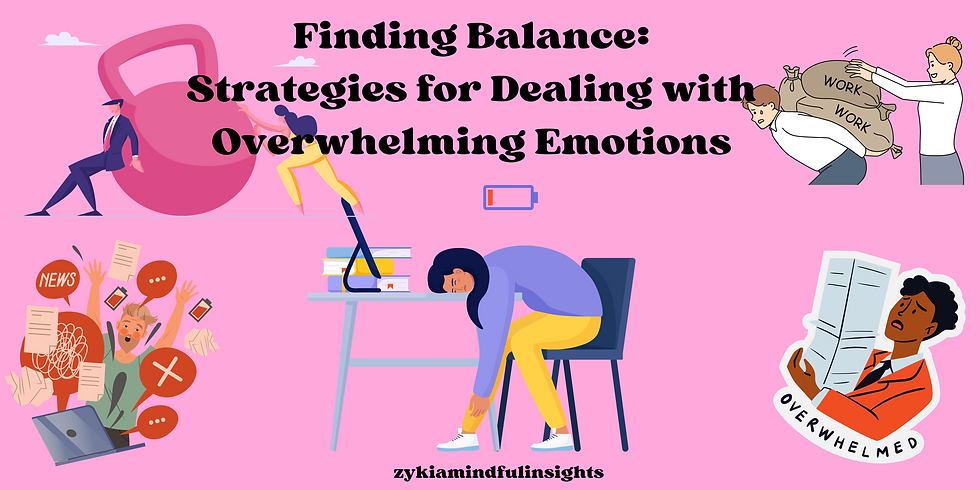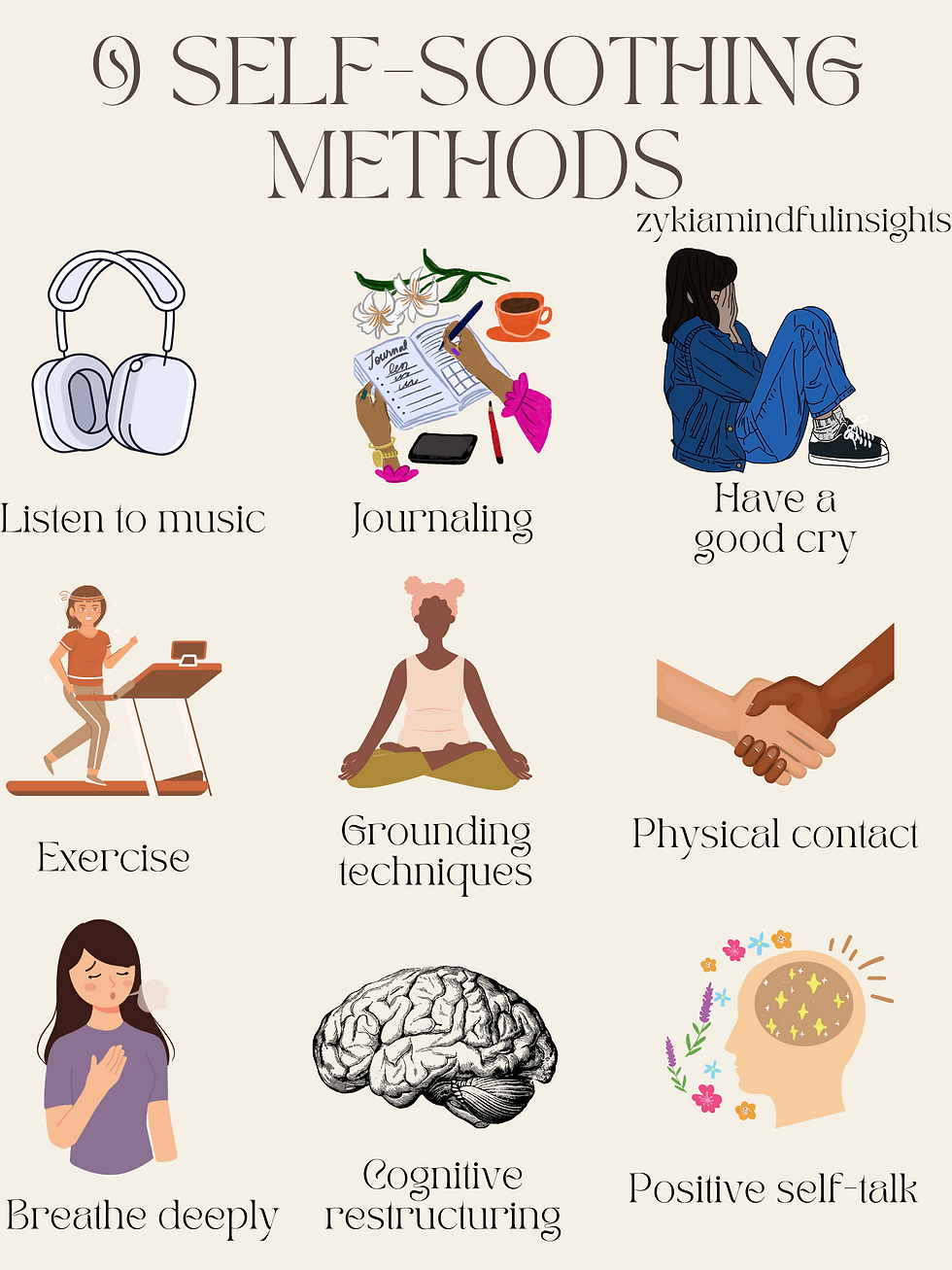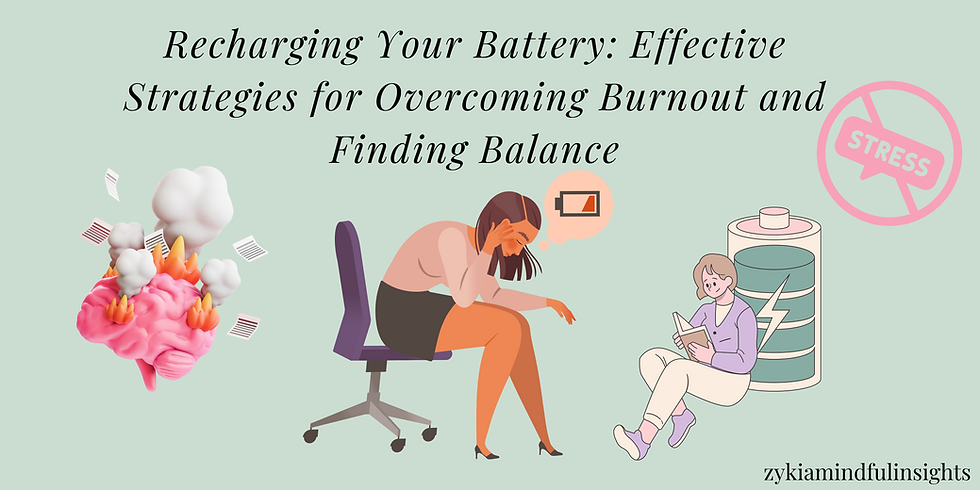Finding Balance: Strategies for Dealing with Overwhelming Emotions
- Zykia Hannah

- Mar 2, 2024
- 6 min read
Balancing emotions is challenging, especially in a hectic, multitasking life. It’s easy to suppress emotions or feel consumed by one, like constant anger. During stressful times, finding this balance is crucial for emotional well-being. Here are some tips to help you achieve emotional balance amidst your busy life.

Finding balance when dealing with overwhelming emotions can be challenging, but there are several strategies that may help:
Recognize and Acknowledge Your Emotions: Take a moment to identify and label what you are feeling. Acknowledging your emotions is the first step to managing them.
Deep Breathing: Deep breathing exercises can help calm the mind and body. Try the 4-7-8 technique: inhale for 4 seconds, hold for 7 seconds, and exhale for 8 seconds. Repeat this a few times.
Mindfulness and Meditation: Practice mindfulness or meditation to focus your attention on the present moment. This can help reduce feelings of anxiety or stress.
Engage in Physical Activity: Physical activity, such as going for a walk or practicing yoga, can help release pent-up energy and improve your mood.
Talk to Someone: Sharing your emotions with a trusted friend, family member, or therapist can provide support and help you gain perspective on your situation.
Write it Down: Journaling your thoughts and feelings can be a helpful way to process and understand what you're going through.
Limit Exposure to Stressors: If certain situations or people are contributing to your overwhelming emotions, try to limit your exposure to them or find ways to cope with them.
Practice Self-Care: Take time for yourself to engage in activities that you enjoy and that help you relax, such as reading, taking a bath, or listening to music.
Set Boundaries: It's important to set boundaries with yourself and others to protect your emotional well-being. Learn to say no when necessary and prioritize your own needs.
Seek Professional Help: If overwhelming emotions are interfering with your daily life or persisting over a long period, consider seeking help from a mental health professional. They can provide guidance and support tailored to your specific needs.
Remember that finding balance is an ongoing process, and it's okay to seek help when needed. Be patient with yourself and prioritize self-care.
Achieving emotional balance isn't always straightforward, especially with a hectic schedule. When emotions are left unchecked, they can overwhelm us in various ways. For instance, we might find ourselves bottling up painful feelings or being perpetually swamped by one emotion, like unwarranted anger. When life becomes overwhelming, striving for emotional balance becomes essential to maintain mental well-being and stability. Explore the following tips and techniques to cultivate emotional balance amidst the hustle and bustle of life.
“Balance is not something you find, it’s something you create. In dealing with overwhelming emotions, it’s about finding a blend of acceptance, self-care, and practical strategies.”
Dealing with overwhelming emotions can be a daunting challenge that leaves one feeling lost, confused, and paralyzed. These emotions, such as fear, anxiety, or anger, can consume a person's life, making it difficult to function or enjoy everyday activities. However, it is possible to find balance amidst the chaos by implementing effective strategies.
One crucial aspect of finding balance is acknowledging and accepting your emotions. Ignoring or suppressing them can lead to even more stress and anxiety. Instead, take the time to identify and name your emotions. This allows you to address them head-on, reducing their intensity and empowering you to take control of your emotional state.
Deep breathing exercises are a powerful tool for managing overwhelming emotions. By slowing down your breath and focusing on inhaling and exhaling deeply, you can activate your body's relaxation response. This helps calm your nervous system and reduce the intensity of your emotions. You can practice deep breathing exercises anywhere, at any time, making them an accessible and effective strategy for finding balance.
Another helpful strategy for dealing with overwhelming emotions is mindfulness meditation. This practice involves focusing your attention on the present moment without judgment. By becoming more aware of your thoughts and feelings, you can gain a clearer understanding of what triggers your emotions and how to manage them. Regular meditation practice can also enhance your overall emotional well-being and resilience.
Physical activity is an effective way to release built-up tension and stress. Engaging in activities like running, dancing, or yoga can help you reconnect with your body and distract yourself from negative thoughts. Exercise releases endorphins, the body's natural mood boosters, which can help improve your mood and reduce feelings of anxiety and depression.
Lastly, it's essential to take care of your overall well-being to maintain emotional balance. This includes getting enough sleep, eating a balanced diet, and managing stress through relaxation techniques like reading, listening to music, or spending time in nature. Prioritizing self-care can help you recharge and approach challenging situations with a clear mind and balanced emotions.
In conclusion, finding balance in the face of overwhelming emotions requires a combination of self-awareness, self-care, and effective coping strategies. By acknowledging your emotions, practicing deep breathing and mindfulness meditation, engaging in physical activity, and prioritizing self-care, you can regain control of your emotional well-being and live a more balanced and fulfilling life.
"Strive for balance in every aspect of your life. Make time for self-care, engage in activities that bring you joy, and cultivate a support system that helps you navigate through overwhelming emotions."
What is emotional balance?
Emotional balance is the ability to manage and regulate one's emotions effectively, regardless of the situation. It involves being aware of and acknowledging emotions, understanding their root causes, and responding to them in a healthy and adaptive manner. Emotional balance does not mean always feeling happy or positive; rather, it means being able to navigate a full range of emotions while maintaining stability and resilience.
How to Cultivate Emotional Balance?
Maintaining emotional balance may sound like an abstract concept, but it is achievable with consistent effort. One approach is to become more attuned to your emotions, as many people may not recognize their feelings until they're in a confrontation or experiencing stress. Implementing some of the following strategies regularly can help:
Daily Self-Check-in: Dedicate time each day to tune into your emotions. This could involve journaling, quiet reflection, or sharing your thoughts with a trusted individual. Cultivating awareness of your emotional state allows you to address any potential stressors or sources of discomfort.
Practice Self-Compassion: Remember, emotional balance doesn't mean perpetual happiness. It's normal to experience a range of emotions. Embrace self-acceptance and understand that life has its ups and downs. Despite societal pressures to constantly project happiness, it's okay to acknowledge when you're not feeling your best.
Prioritize Self-Care: Self-care encompasses more than just indulgent activities like baths or massages (though those can be helpful!). It's about ensuring your fundamental needs are met and putting yourself first. This might involve maintaining a routine, eating nutritious meals, getting sufficient sleep and exercise, and adhering to prescribed medications.
Acknowledge and Process Painful Emotions: Emotional balance involves addressing all emotions, even the uncomfortable ones like anger, fear, or sadness. Repressed emotions can fester, so find a constructive way to express them. This might include activities like kickboxing, music, painting, or even allowing yourself to have a good cry.
Know When to Seek Support: It's vital to understand that it's okay to ask for help. If you're feeling overwhelmed, anxious, or depressed, professional support is available. Acknowledging and addressing mental health concerns demonstrates strength and self-awareness.
Improving emotional balance is a journey that requires time and patience. It's important to have realistic expectations, recognizing that achieving equilibrium involves adapting to what you can control, accepting what you can't, and managing life's fluctuations with grace. While the process may not yield immediate results, perseverance and dedication will eventually lead to a noticeable improvement in your emotional well-being.

Finding balance in the midst of overwhelming emotions is an ongoing journey that involves recognizing, accepting, and managing one's feelings in a healthy way. From acknowledging and labeling emotions to practicing deep breathing, mindfulness meditation, and engaging in physical activity, there are numerous strategies to help maintain emotional well-being. Prioritizing self-care, seeking support when needed, and being mindful of one's emotions are key components of fostering emotional balance. It's important to remember that achieving balance isn't about never feeling negative emotions but rather about managing them effectively and finding a blend of acceptance and resilience. By making a commitment to self-awareness and employing practical coping mechanisms, individuals can cultivate emotional balance and lead healthier, more fulfilling lives.
🤍Quote of the day:
"Be happy and take care of yourself, but be happy with the beautiful things that make you, you." - Beyonce✨




Commentaires